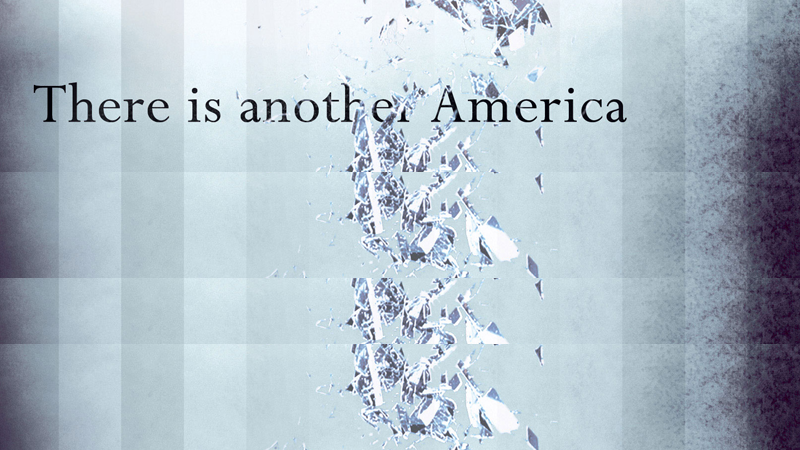Some ideas answer questions, asked or in-waiting, with such ease that they linger, like rocks in a river, and change the course of history. Books are one such idea. The technology is more than 500 years old, and remains relatively unchanged. But some books have unarguably changed the course of history.
One (still controversial) academic study by a Victorian scientist comes immediately to mind. On the Origin of the Species by Means of Natural Selection, or the Preservation of Favoured Races in the Struggle for Life, first published in 1859 by Charles Darwin, caused a bit of a stir when it was printed. You can imagine his publisher saying, “That title is a mouthful, Charles, you’re never going to sell a single copy!” Darwin eventually shortened it to the familiar The Origin of Species for the 1872 edition. It was a book that changed the world and continues to do so.
Karl Marx, another academic, spent much of his life writing Das Kapital, Kritik der politischen Ökonomie, which we know (but don’t love quite so much) as Capital: Critique of Political Economy. Whatever our feelings about the book and its ideas, the remnants of a wall in Berlin attest to its power.
It may be tempting to think that world-changing literature must be non-fiction, but that is clearly not the case. Jane Austen’s entire oeuvre, from Sense and Sensibility to Persuasion, changed the way we saw ourselves and others – and will always do so. George Orwell’s 1984 changed the way we looked at the real-world results of Karl Marx’s work, and continues to inform our vision of our own growing “kleptocracy.” Moreover, July 1, 1984 saw the publication of Neuromancer by a then-unknown Canadian science-fiction writer named William Gibson. With the word, “cyberspace,” (coined for the earlier short story “Burning Chrome,” but used and explored extensively in the novel) Gibson single-handedly laid the foundational block for our connected world.
More than 2 million books were published this year. Statistically, it’s certain that some will prove to change history, and not just by virtue of re-writing and revising it, though that’s an honorable and time-tested manner of doing so. With that in mind, here’s a look back at the last year in book history, before it gets revised, and some books worthy of provoking change.
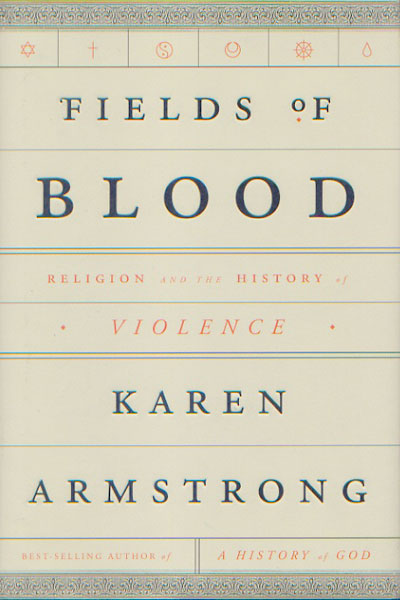
Fields of Blood: Religion and the History of Violence
by Karen Armstrong
Current history seems rife with examples of religious violence. Without irony, it’s a common belief that belief itself is a major contributor to the violent tendencies of humankind. We’re told that religions, made to bring out the best in mankind, do exactly the opposite. This reader might have thought as much as well, but after finishing religious scholar Karen Armstrong’s latest book, Fields of Blood: Religion and the History of Violence, I’ve begun the healthy process of questioning my own beliefs.
Armstrong argues, quite convincingly, that our notion of “religion” is flawed at best, and that the idea of separating religion from every other damn thing in our lives is laughable. She then goes on to take a second, third, or ten thousandth look at, well, the entire history of the world. She writes both powerfully and engagingly. She may be a scholar, but she’s writing for anyone who cares about the world around them, which should be most of us. Before you finish this book, you’ll want to see that it gets into every classroom in the world. Buy two copies, one to keep and re-read, and one to press on your friends. Well, friend. Chances are you won’t get it back.
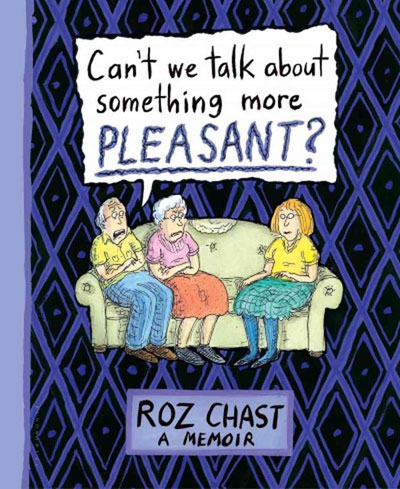
Can’t We Talk about Something More Pleasant?: A Memoir
by Roz Chast
The world is growing older, faster, than ever before in history. It’s not just medical technology driving this; our ability to get decent food and shelter is the basis for a life less threatened. The upshot is that we find ourselves at a turning point where more and more of us are ending up as the caretakers of aging parents. No one has spoken for those caretakers as well as Roz Chast in her graphic memoir Can’t We Talk about Something More Pleasant? That’s the question spoken and unspoken in Chast’s parents’ minds as their daughter Roz finds herself called to tasks she’d never imagined.
This book is a powerful example of the graphic memoir form, and for those who have not yet had this kind of life experience, it’s a truly eye-opening vision of what’s to come from both sides of the equation. As Chast tells the stories of her parents’ physical decline with humor, joy, love and anguish, expressing the double vision that is inherent in taking care of one’s parents. Through Chast’s candor, we understand that soon enough, we will need that kind of care as well. How will we cope? Our children’s children’s children will read this book in a future we cannot imagine, but their tears will be no different from ours.
LISTEN: Roz Chast Discusses Can’t We Talk about Something More Pleasant?
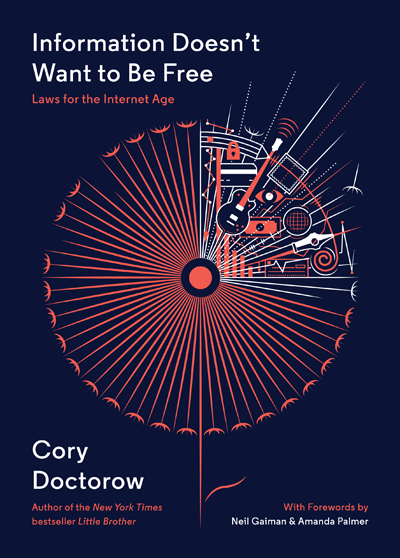
Information Doesn’t Want to Be Free: Laws for the Internet Age
by Cory Doctorow
The word “freedom” is bandied about with complete aplomb, generally by those oblivious to the fact that it is a whirling, roaring chainsaw that cuts both ways. Cory Doctorow, a novelist and an information-age activist, is keenly aware of the many meanings of freedom, and of the feedback loop that exists between unfettered technological change and society. Information Doesn’t Want to Be Free examines the notions of freedom, creativity and responsibility in an inherently unstable world.
Doctorow knows that literature is itself a technology, and he uses it wisely. Here, he’s talking about that battle between laws that are discovered and those that are legislated. The latter inevitably lose when they come up against the former, but often not before damaging and destabilizing society as an unfortunate side effect. Doctorow boils his discovered laws down to three tenets; “Any Time Someone Puts a Lock on Something That Belongs to You and Won’t Give You the Key, That Lock Isn’t There for Your Benefit;” “Fame Won’t Make You Rich, But You Can’t Get Paid Without It;” and “Information Doesn’t Want to Be Free, People Do.” He spins each one into a series of attention-grabbing, thought-provoking little essays. The power of crispy-clear thought and logic leaps off these pages. Long after the technologies are obsolete, the first principles Doctorow discusses will still be in action, in our lives and the lives of those who follow.

Let Me Be Frank With You
by Richard Ford
In another life, Richard Ford would have been a clinical psychologist, whose insights into the human psyche would be the foundation of whole schools of thought. We’re extremely, incredibly fortunate then, that in this world he’s a novelist and fiction writer. In his latest book, Let Me Be Frank With You, Ford returns to the voice of his greatest creation, one-time sports-writer and realtor, Frank Bascombe. Overtly, the book looks at the aftermath of Hurricane Sandy. But make no mistake, the four stories here are perfect windows into the American soul. Sex, politics, personal power and frailty, approaching the end of life, how we know who we are – Ford tells it all with a perfect balance of humor and wisdom.
The key to Ford’s power is his ability to evoke full-on laughter and deep introspection at once, often in the same sentence. The humor underscores the wisdom without undermining the effect. His understanding of the interplay between our motivations and the desires of those around us is similar to that of Jane Austen, even if his milieu is vastly different. Ford evokes the eternal absurdities of human life in the mundane world of the New Jersey suburb of Haddam. This book is shorter than any of its predecessors, but no less brilliant for its brevity. Let Me Be Frank With You lives up to its title in every way possible. It’s a mirror, and like those made of glass and silver, it will always work whether you want it to or not.

The Peripheral
by William Gibson
Don’t let the genre or the setting fool you. William Gibson’s The Peripheral offers not one but two futures, entwined in a dance as dense and intricate as that of Neuromancer. But like every science fiction writer, he’s writing in the present and about the present. In alternating chapters, we follow the lives of two very different characters. Flynne is a young woman who plays video games to test them and to help less-skilled players achieve a one-up. Wilf is a celebrity handler with more problems than he’d prefer to be handling. As the two very different narratives spiral around and towards one another we see the effects of Big Technology on very small lives.
Only time will tell if these Gibson futures are as eerily predictive as Neuromancer now seems. But in the present, it is perfectly clear that this is a carefully sculpted vision of the forces that shape our world, regardless of what year it is. It’s also a spot-on look at how we experience the present, the casual iceberg of unspoken knowledge upon which our daily lives drift. More than just about any novelist out there, Gibson seems to be able to summon the Platonic ideals that cast their shadows into our world. Reading The Peripheral, now or in a future very different from that portrayed, you will feel submerged in the tidal forces that shape our lives without our knowledge or consent. At least until we look up from the pages in front of us.
LISTEN: William Gibson discusses The Peripheral.
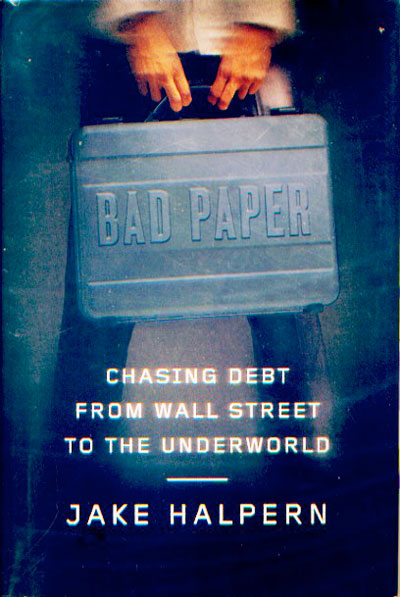
Bad Paper: Chasing Debt from Wall Street to the Underworld
by Jake Halpern
It’s easy to think we understand the workings of the world, how money moves and matters. It’s quite another to see what really happens from the street on up, and Jake Halpern’s Bad Paper: Chasing Debt from Wall Street to the Underworld is a tight, smart look at money from the bottom feeders on up – slightly. This work of non-fiction reads like a crackerjack 1950’s noir, re-tooled for the 21st century, an Upton Sinclair-style muckraking of what they sweep from the meat-cutting floor of the financial world and serve up as money for nothing. It’s you. This is the luxury gap in person.
“Paper” in Halpern’s book translates to Excel spreadsheets carrying credit card debt information that’s been written off by the banks. He starts his book with the story of Aaron Siegel, a hedge-fund manager who moves back to his hometown of Buffalo and discovers a grey-zone economy of sold, and unfortunately, sometimes stolen debt information. But as Aaron digs himself into the life, he finds that the seamier it gets, the better it gets, and the same is true of this book. By focusing on what seems to be a tiny bit of wild financial frontier, Bad Paper proves to be an excruciatingly clear look at why we are who we are. Humans, and Americans in particular, are revealed as predators and prey in pursuit of everything, not because we need it but because, by bringing back the prize, we deny it to another. Greed was never as good a read about as it is in Bad Paper.
That mirror? Damn, it’s still working, isn’t it?
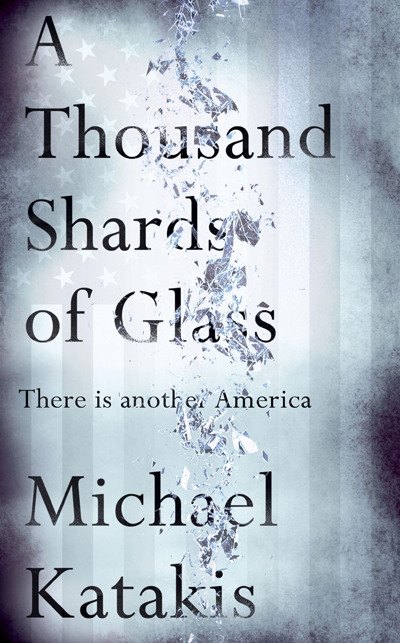
A Thousand Shards of Glass
by Michael Katakis
Well, one way to prevent a mirror from working is to never glance at it. Thank American publishers for that, because American writer Michael Katakis managed to get A Thousand Shards of Glass, his book about the United States, published and acclaimed everywhere but the United States. His U.K. publisher, Simon & Schuster, has nominated the book for the Orwell Prize, and reading the essays herein, it’s easy to see why. In the aftermath of 9/11, Katakis traveled around the U.S. to get a read on what Americans were thinking and feeling. What he finds is both disturbing and inspiring.
Crisp, concise writing makes each of the essays here shards in which we can glimpse ourselves. Of any book in this list, A Thousand Shards of Glass is arguably the most directly world-changing title. It’s being read and well received abroad. Given the combination of caustic self-excoriation and sweet, intelligent sentiment, the world is getting a deeper, more intense portrait of America than America itself. This is a book that is changing the way the world looks at America, for the better, because here you have the raw truth in a real voice. There’s a sparse elegance to the way Katakis addresses matters most personal. The core of the collection is fury and love entwined in “Dying the American Way,” the story of American healthcare as a voracious monster that consumed the author’s wife. It’s heartbreaking, rabble-rousing and eloquent. This is the world we create and the world we live in. It’d be nice if we were able to look it in the eye.
LISTEN: Michael Katakis discusses A Thousand Shards of Glass.:
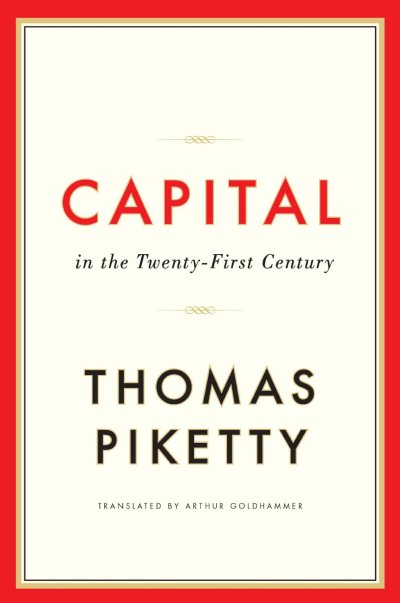
Capital in the Twenty-First Century
by Thomas Piketty
We live in an age of unprecedented wealth – of data. It is, alas, no more than a tool, an instrument that can be hurled at a wall, or used, as Thomas Piketty does here, to craft an inspiring work of art. Of course, what’s inspired is not happiness and joy, but an intimate understanding of what is happening now, beneath the hood of a machine so vast we are not really certain it exists. Capital in the Twenty-First Century is a companion volume to both Bad Paper and Das Kapital.
The genius to be found here, and that will continue to be discovered here – we hope – is Piketty’s ability to translate data into stories and structures that we can understand. The future of the entire world is at stake, and the only possible cure is for us to comprehend what is happening. As long as the seemingly inexorable march towards a futuristic feudalism is concealed behind the minutia of our daily lives, we’ll be content to sail towards a fiscal cliff, and not just the free-for-all fun ride we enjoyed in the past years. Reading this book is a transformative experience, as Piketty and his team of experts examine inequality in a manner that lets readers internalize an intricate, inexorable machine. What many intuit, Piketty intellectualizes, in a way that lets you wrap your brain around the problem. Knowing that the problem exists is the most critical step in solving it.
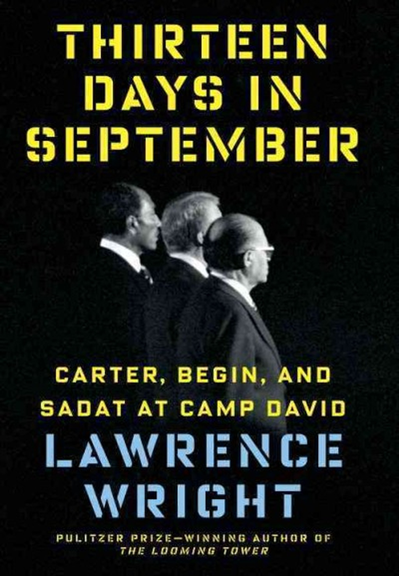
Thirteen Days in September: Carter, Begin, and Sadat at Camp David
by Lawrence Wright
Intractable problems, clashing religions – they’re all the rage this year, and every other. What would we do if we had an example of solving the unsolvable, of bringing together the most assiduous of enemies? We do and we have, and Lawrence Wright’s Thirteen Days in September: Carter, Begin, and Sadat at Camp David suggests that admitting a problem can be solved is possible once the problem’s existence has been identified. Wright takes the history we know and turns it into a page-turning, eye-opening thriller.
Wright is a masterful historian, crafting a cast of characters that remain indelible in our memories, even as we lived through those events. He manages to evoke true tension even though we know how the talks sorted out. Wright’s ability to wrest story from history is unparalleled. Thirteen Days in September excels at giving readers a background in Middle Eastern history to help shade their understanding of the recent past and the present. Wright’s treatment of recent and ancient history and his access to sources lend his story the ring of truth. Close this book and you will never close your mind to the possibility of peace. And that is a message that is worth hearing well beyond this holiday or the next century of holidays.
LISTEN: Lawrence Wright discusses Thirteen Days in September: Carter, Begin, and Sadat at Camp David.
We know for a fact that books can change the world. Our world now – fraught with wars, clashing religions, inequality, love, joy, terror and hope – is captured in the words of these books. Atoms in an ocean, molecules of water form a wave. No single being comprehends the whole, but each of us is part of that whole. Each word on a page stands on its own, and no word knows the book within which it is written.
